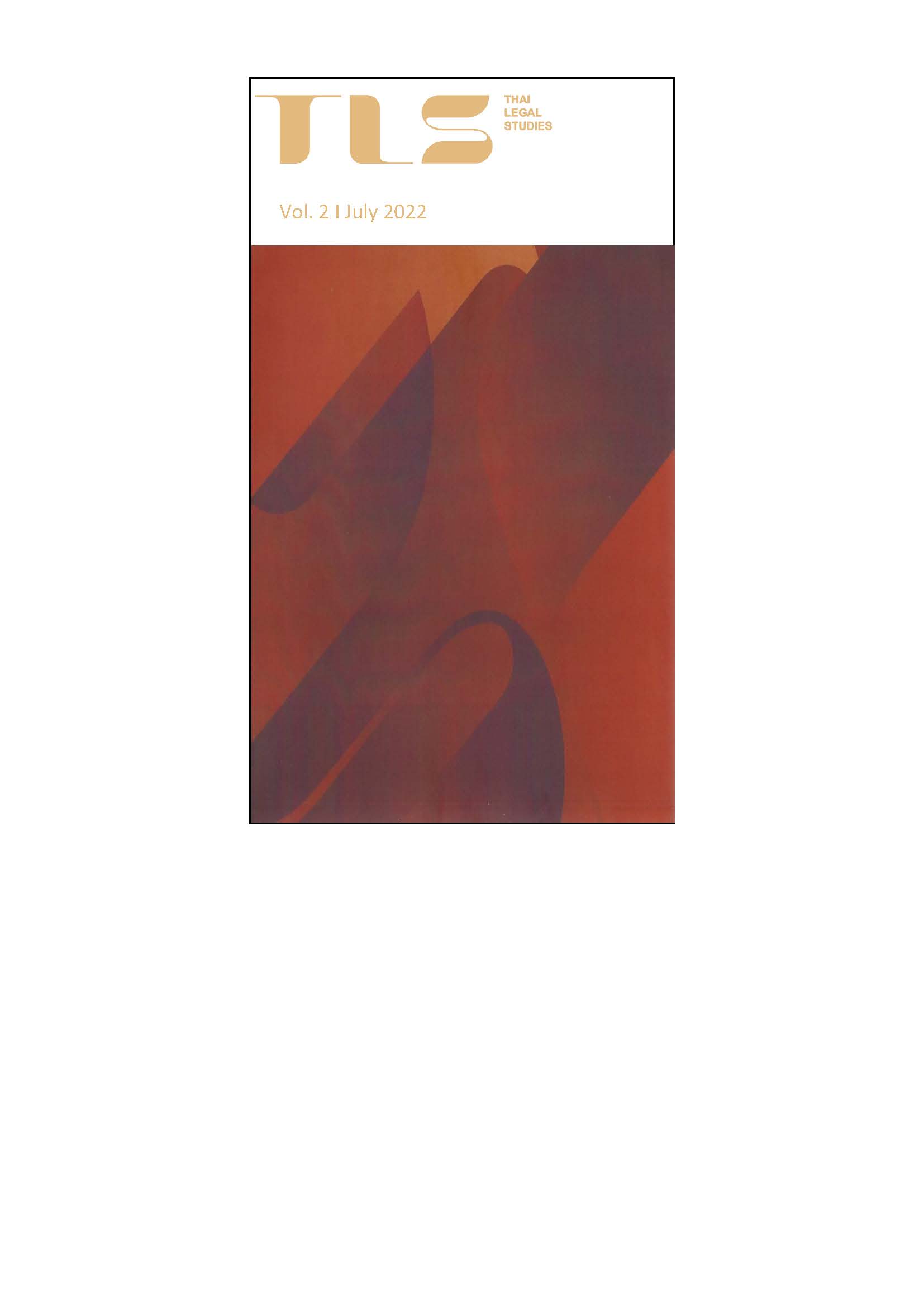Judicial Review of Arbitration Awards on the Ground of Public Policy under the Law of Thailand: An Excessive Judicial Intervention?
DOI:
https://doi.org/10.54157/tls.254540Keywords:
arbitration, public policy, arbitration awards, New York ConventionAbstract
This article explores how the Supreme Court and the Supreme Administrative Court have interpreted and applied the concept of public policy for the setting aside or non-enforcement of arbitration awards. It is found that the courts’ approach to the interpretation of the public policy defence appears to be broader than the approach that courts in foreign jurisdictions use in the context of international commercial arbitrations. The current approach seems to be that Thai courts will draw the line between questions of fact and questions of law, whereby only questions of fact are not subject to judicial review. This means that any errors made by arbitral tribunals in deciding questions of law may result in the arbitration awards being set aside or refused for enforcement by the courts on the ground of public policy. The author then concludes that this broad ambit of the public policy defence can be seen as an excessive judicial intervention in arbitration which may undermine the fundamental objectives of arbitration as a dispute resolution mechanism.
References
Arthur, John. “The Legislative Context for International and Domestic Commercial Arbitration in Australia.” (2014) Australian Alternative Dispute Resolution Law Bulletin July.
Berg, Albert Jan van den. The New York Arbitration Convention of 1958 (Kluwer Law and Taxation 1981).
Bermann, George. International Arbitration and Private International Law (Hague Academy of International Law 2017). https://doi.org/10.1163/9789004348271
Besaiso, Haytham. “How Do International Construction Arbitrators Make Their Decisions? The Status of Substantive Law.” (2020) 37 International Construction Law Review 199.
Böckstiegel, Karl-Heinz. “Public Policy as a Limit to Arbitration and its Enforcement.” (2008) 2(1) Dispute Resolution International.
Born, Garry B. International Commercial Arbitration (3rd edn, Kluwer Law International 2021).
Cirlig, Ramona Elisabeta. “The Interplay Between Courts and Tribunals Assures Access to Justice.” In Leonardo Valladares Pacheco de Oliveira and Sara Hourani (eds), Access to Justice in Arbitration: Concept, Context and Practice (Kluwer Law International 2020).
Gotanda, John Yukio. “Compound Interest in International Disputes.” (2003) 34(2) Law & Policy in International Business.
Hayne, Kenneth. “Letting Justice Be Done Without the Heavens Falling.” (2001) 12 Monash University Law Review 12.
Koch, Christopher. “Standards and Procedures for Disqualifying Arbitrators.” (2003) 20(4) Journal of International Arbitration. https://doi.org/10.54648/joia2003026
Lew, Julian. Applicable Law in International Commercial Arbitration: A Study in Commercial Arbitral Awards (Oceana Publications 1978).
Menon, Sundaresh. “The Rule of Law and the SICC.” (2018) Singapore International Chamber of Commerce Distinguished Speaker Series 6.
Oliveira, Leonardo Valladares Pacheco de. “To What Degree Should Access to Justice Be Secured in Arbitration?” In Leonardo Valladares Pacheco de Oliveira and Sara Hourani (eds), Access to Justice in Arbitration: Concept, Context and Practice (Kluwer Law International 2020).
Pirker, Benedikt. “Proportionality Analysis and International Commercial Arbitration – The Example of Public Policy and Domestic Courts.” In Joanna Jemielniak, Laura Nielsen, and Henrik Palmer Olsen (eds), Establishing Judicial Authority in International Economic Law (Cambridge University Press 2016). https://doi.org/10.1017/CBO9781316544860
Qian, Mingqiang. “Public Policy Defense in International Commercial Arbitration.” (Master of Laws Thesis, University of Georgia, 2000).
Ratima Nirunpornputta. “Judging State International Commercial Arbitration Law in Thailand: A Comparative Study with Singapore.” Thai Arbitration Institute (2019). https://tai.coj.go.th/en/content/article/detail/id/78/iid/165490
Templeman, John. “Towards a Truly International Court of Arbitration.” (2013) 30(3) Journal of International Arbitration 197. https://doi.org/10.54648/JOIA2013016
Veena Anusornsena. “Arbitrability and Public Policy in Regard to the Recognition and Enforcement of Arbitral Award in International Arbitration: The United States, Europe, Africa, Middle East and Asia.” (SJD diss, Golden Gate University, 2012).
Werner, Jacques. “Should the New York Convention Be Revised to Provide for Court Intervention in Arbitral Proceedings?” (1989) 6 Journal of International Arbitration 113. https://doi.org/10.54648/JOIA1989029
Yates, Chad R. “Manifest Disregard in International Commercial Arbitration: Whether Manifest Disregard Holds, However Good, Bad, or Ugly.” (2018) 13(2) University of Massachusetts Law Review 336.
Zhiltsov, Alexei Nikolaevich. “Mandatory and Public Policy Rules in International Commercial Arbitration.” (1995) 42 Netherlands International Law Review 81. https://doi.org/10.1017/S0165070X00003387
Sources in Thai
Saranwan Chotinimitkul. “Remark on Supreme Court Decision 3647/2549.” http://deka.supremecourt.or.th/
Sorawit Limparangsri. “Remark on Supreme Court Decision 9658/2542.” http://deka.supremecourt.or.th/
จิตติ ติงศภัทิย์. “ความรู้เกี่ยวกับอนุญาโตตุลาการระหว่างประเทศ.” ในรวมผลงานวิชาการของศาสตราจารย์จิตติ ติงศภัทยิ์ เล่มที่ 1 (สำนักงานศาลยุติธรรม 2562). [Chitti Tingsabadh. “Knowledge About International Arbitration.” In Collection of Academic Works of Professor Chitti Tingsabadh No. 1 (Office of Court of Justice 2019).]
จิตติ ติงศภัทิย์.. “หมายเหตุท้ายฎีกาที่ 297/2501.” ในรวมผลงานวิชาการของศาสตราจารย์จิตติ ติงศภัทยิ์ เล่มที่ 2 (สำนักงานศาลยุติธรรม 2562). [Chitti Tingsabadh. “Comments on Supreme Court Decision 297/2501.” In Collection of Academic Works of Professor Chitti Tingsabadh No. 2 (Office of Court of Justice 2019).]
จี๊ด เศรษฐบุตร. หลักกฎหมายแพ่งลักษณะนิติกรรมและหนี้ (พิมพ์ครั้งที่ 2, โรงพิมพ์เอราวัณการพิมพ์ 2522). [Jeed Sethaputra. The Legal Principles of Juristic Acts and Obligations (2nd edn, Erawan 1979).
ธวัชชัย สุวรรณพานิช. “ความสงบเรียบร้อยและศีลธรรมอันดีของประชาชนและการอนุญาโตตุลาการ: คำพิพากษาศาลปกครองกลาง คดีหมายเลขแดงที่ 1659–1660/2555.” (2012) วารสารกฎหมายทรัพย์สินทางปัญญาและการค้าระหว่างประเทศ. [Thawatchai Suvanpanich. “The Public Policy and the Good Morals of the People: The Judgment of the Central Administrative Court Red Case No. 1659–1660/2555.” (2012) Intellectual Property and International Trade Forum.]
ประกอบ ประพันธ์เนติวุฒิ. กฎหมายระหว่างประเทศแผนกคดีบุคคลและคดีอาญา (พิมพ์ครั้งที่ 7, มหาวิทยาลัยรามคำแหง 2541). [Prakob Prapannetivuth. Private and Criminal International Laws (7th edn, R. Ramkhamhaeng 1998).]
ปาลีรัฐ ศรีวรรณพฤกษ์. “ศาลปกครองกับการฟ้องร้องขอให้เพิกถอนคำชี้ขาดของอนุญาโตตุลาการ: ศึกษาเปรียบเทียบกฎหมายไทยและกฎหมายฝรั่งเศส.” (2561) 18(3) วารสารวิชาการศาลปกครอง. [Paleerat Sriwannapruek. “The Administrative Court and the Petition for Setting Aside an Arbitral Award: Comparative Study Between Thai Law and French Law.” (2018) 18(3) Administrative Court Journal.]
มยุรา อินสมตัว กมลชัย รัตนสกาววงศ์ และสิริพันธ์ พลรบ. “ปัญหาการปรับใช้ข้อกฎหมายอันเกี่ยวด้วยความสงบเรียบร้อยของประชาชนในคดีศาลปกครอง.” (2563) 13(2) วารสารกระบวนการยุติธรรม 53. [Mayura Insomtua, Kamolchai Rattanasakalwong, and Siriphan Polrob. “Problems on the Application of Law Concerning Public Order by the Administrative Court.” (2020) 13(2) Journal of Thai Justice System 53.]
วิชัย อริยะนันทกะ และคณะ. “พรหมแดนของความสงบเรียบร้อยและศีลธรรมอันดีของประชาชนในการบังคับตามคำชี้ขาดของอนุญาโตตุลาการอยู่ที่ใด.” (2007) วารสารอนุญาโตตุลาการ 10. [Vichai Ariyanuntaka and others. “Where are the Boundaries of Public Policy for Enforcement of Arbitration Awards?” (2007) Journal of Arbitration 10.]
สถาบันอนุญาโตตุลาการ. รายงานสถานการณ์อนุญาโตตุลาการ ประจำปี 2563. (2563). [Thailand Arbitration Center. Annual Report of Arbitration Situations 2020. (2020).]
สายหยุด แสงอุทัย. การขัดกันแห่งกฎหมาย: หลักทั่วไปของกฎหมายระหว่างประเทศแผนกคดีบุคคลและคำอธิบายพระราชบัญญัติว่าด้วยการขัดกัน แห่งกฎหมาย พุทธศักราช 2481 เรียงมาตรา (สยามพาณิชยการ 2482). [Saiyut Saenguthai. Conflict of Laws: General Principles of Private International Law and Clause-by-Clause Commentary on the Conflict of Laws Act B.E. 2481 (Siampanichayakarn 1939).]
เสนีย์ ปราโมช. นิติกรรมและหนี้ (มหาวิทยาลัยวิชาธรรมศาสตร์และการเมือง 2477). [Seni Pramoj. Juristic Act and Obligation (University of Moral and Political Sciences 1934).]
อภิสิทธิ์ ใต้ระหันต์. “ความสงบเรียบร้อยของประชาชน.” (วิทยานิพนธ์นิติศาสตรมหาบัณฑิต, มหาวิทยาลัยธรรมศาสตร์ 2559). [Aphisit Teirahunt. “Public Order.” (LLM Thesis, Thammasat University, 2013).]
อรรัมภา ไวยมุกข์. “ปัญหาการคุ้มครองคู่สัญญาที่อ่อนแอกว่าในหลักกฎหมายขัดกันไทย.” (2560) 10(1) วารสารนิติศาสตร์มหาวิทยาลัยนเรศวร. [Awnrumpa Waiyamuk. “Problems Concerning the Protection of Weaker Contracting Parties in Thai Conflict-of-Laws Rules.” (2017) 10(1) Naresuan University Law Journal.]
Published
Issue
Section
License
Copyright (c) 2022 Thanapat Yaemklin

This work is licensed under a Creative Commons Attribution 4.0 International License.
Authors retain copyright and publishing rights without restrictions, but grant Thai Legal Studies the right of first publication in English and to distribute the work under a Creative Commons Attribution 4.0 International Public License (“CC BY 4.0”). It allows others to freely share the work, including the making of translations. There is no charge or fee for readers to immediately view published articles or content, and users are allowed to read, download, copy, distribute, print, search, link to the full texts of the articles, or use them for any other lawful purpose, without asking prior permission from Thai Legal Studies or the author(s), the only requirement being that an acknowledgement is given of the work’s authorship and its initial publication in English by Thai Legal Studies.







